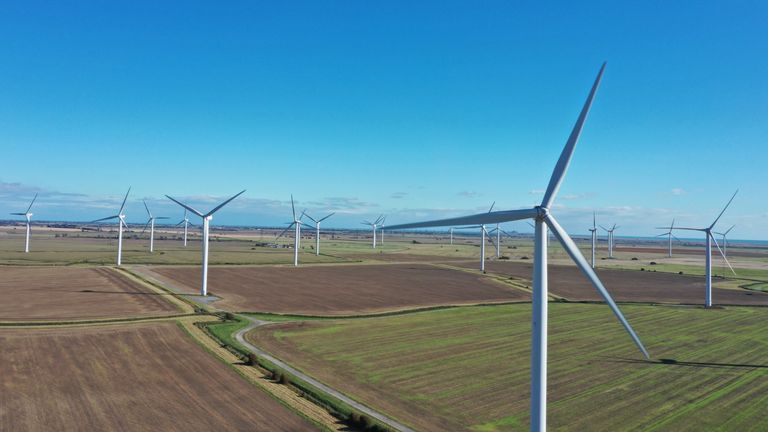Boost for onshore wind with government to relax planning rules
The government is to loosen what is seen as an effective ban on onshore wind after a campaign from rebel backbench MPs. But industry and campaigners warn the "feeble tweaks" are not enough to reinvigorate the industry after years of stalled growth.
Tuesday 5 September 2023 17:18, UK
The government is to relax planning permission for new onshore wind farms following pressure from Conservative rebel MPs.
The changes, which come into force immediately, scrap a previous rule that allowed just one objection to stand in the way of a new onshore development.
Sir Alok Sharma, president of the COP26 climate talks in Glasgow in 2021, led a group of Tory backbench MPs campaigning for the change, which came via an amendment to the Energy Bill.
The new measures will also allow communities to apply to their local council to have onshore wind turbines in their area, although elected councillors would still make the final decision.
They will also speed up the process of allocating sites by giving alternatives to the current local plan process, the government said.
Industry and campaigners have warned the changes are not enough to unblock onshore wind, calling for more dramatic changes to the planning system.
Levelling Up Secretary Michael Gove said: "To increase our energy security and develop a cleaner, greener economy, we are introducing new measures to allow local communities to back onshore wind power projects.
"This will only apply in areas where developments have community support, but these changes will help build on Britain's enormous success as a global leader in offshore wind, helping us on our journey to net zero."
In a bid to incentivise more projects, communities that back local wind farms could also benefit from cheaper energy, the government added.
Wind power - along with other clean renewables and nuclear - is seen as an important way the UK can reduce its contribution to climate change because it releases negligible greenhouse gases.
Onshore wind in the UK is cheaper and faster to build than offshore, but suffers from less reliable wind.
Read more:
Could an onshore wind farm end up on your doorstep?
How a Bristol wind turbine is tackling poverty and climate change
Sir Alok told BBC Radio 4's Today programme the "outdated" right of an individual to effectively veto a wind farm is to be removed.
He said: "The current situation we have is that just one objection can prevent a wind farm from being built.
"I mean, clearly, that is not a community veto and, frankly, I don't think it's a sensible way for a planning system to operate."
Tory MP Sir John Hayes has expressed concern about onshore wind turbines being "imposed on communities that don't want them".
The government said elected local councillors, accountable to residents, will make the final decision, and plans would be taken forward where local support can be evidenced.
Greenpeace UK's policy director, Doug Parr, said the "feeble tweaks" will "result in very little wind".
"Developers will continue to face uncertainty over planning process and be beholden to quixotic decisions by local councils," he said. "Who will put their money into developing projects under those circumstances?"
Tania Kumar from business group CBI said fully unlocking investment in the industry requires more changes to the planning system, a "core lever to ensure that the UK can strive to provide a competitive business environment".
The existing rules began in 2015 under David Cameron amid a wider push-back against green policies, and many Conservative MPs had rural constituencies where turbines were unpopular.
Click to subscribe to ClimateCast with Tom Heap wherever you get your podcasts
Since then, onshore wind stalled, amounting to what many have called a de-facto ban on the renewable power source.
Just 16 new turbines were granted planning permission between 2016-2020, a fall of 96% on the 435 granted between 2011-2015, according to Cardiff University analysis of government data.
But with climate concerns rising up the political agenda, polling earlier this year suggested onshore wind farms were more popular with the public than among members of parliament.
A YouGov poll of 2,000 adults in April found 63% of people who voted Conservative in the last general election had a "favourable" view of onshore wind, and 68% said they would support it in their area.
But a parallel survey - conducted by YouGov for green thinktank ECIU - of 103 polled MPs found almost half (47%) thought their constituents would oppose a new onshore wind farm in their area, including two thirds (68%) of Conservative MPs and 30% of Labour MPs.


